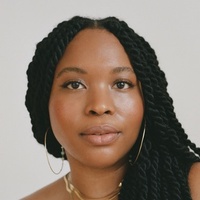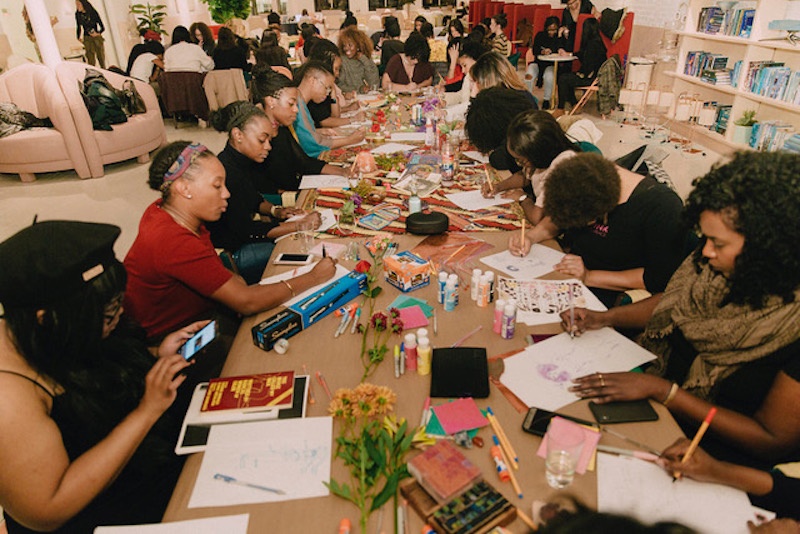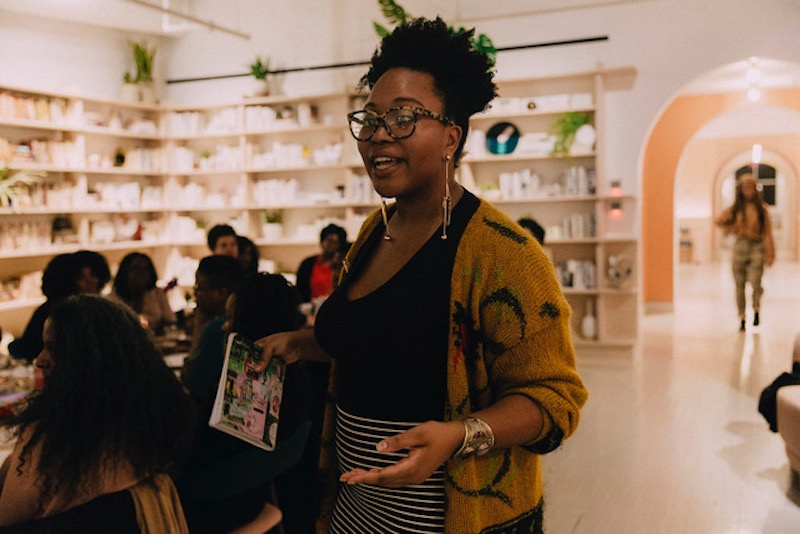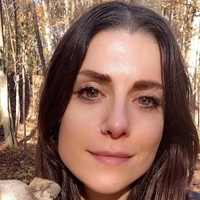As told to Grashina Gabelmann, 2339 words.
Tags: Poetry, Education, Identity, Mental health, Process.
On connecting through listening
Poet, writer, and educator Giselle Buchanan discusses giving workshops for different communities, leaning into living, and how impact can take on many forms.What is your creative practice?
I primarily think of myself as a writer and a poet. That has been what I’ve done the longest, and it feels the most true to me. However, I also consider myself a multidisciplinary artist. I do a lot of zine making and mixed media projects with my poems. An interdisciplinary practice is what comes naturally to me, and it feels the most honest.
And you’re also an educator.
Yes.
When did you start that branch of your practice?
I think I learned that it was possible to be an educator when I was in high school. I was part of a poetry club, and one of the teachers who facilitated the club said, “You’re an amazing writer. There’s this organization that you should be a part of. They’re doing a contest.” It was for college scholarships. And so I said, “Okay, I’ll try.”
I entered the poetry competition and an aspect of it was to participate in writing workshops leading up to the final performance. Studying with the facilitators in those workshops who were all “professional poets” was the first time I saw being a poet as a job. A real job that regular people who look like me could do. I became obsessed with that organization and went nearly every day for two years. It was there that I realized what I want to do in life is accessible. Maybe I won’t be a bestselling poet, but I could be a poet. I could do my work and do it sustainably. Teaching became an avenue for that.
Around that time I participated in a design and screen-printing apprenticeship, with an organization that no longer exists called Harlem Textile Works. It was a space where I could approach using my skills in a multidisciplinary way. It was there where I was first introduced to actively facilitating my own workshops.
What are some of the places you’ve given workshops at?
Nonprofits, corporate offices, elementary schools, universities, museums, forests, even a jail. Anywhere. It has been a kind of fluid exploration. Creativity is a practice, a personal practice, but also a communal practice and an offering that I can give to people, all kinds of people.
Do you adapt your workshops to your audience or is there a common denominator?
The format stays the same, for the most part. A prompt, and then communal sharing. Within that formula, there’s so much room to experiment, so it takes on many different shapes. It morphs according to how I’m feeling. How the room feels. It’s a conversation. I never step into a room and feel like I know everything. Sometimes, what you think is supposed work doesn’t. You have to be adaptable.
What I really liked about taking your workshop is that you seem genuinely curious and excited about people sharing their work even though you’ve been giving workshops for over 10 years.
Yeah. I mean, it’s a little selfish. I genuinely love listening to people share their work. I remember the first time I took a writing workshop. It was in that after school program. I sat at a table with 30+ students. Before that, writing was a solo endeavor- me and my notebook, alone in a corner. When I got to that room, it became a communal practice where we were all given the same task, then we got to listen to each other. We got to see all the worlds that were created out of one shared exercise.
I really love being around other creative people, and I love the practice of listening to poems. I think they’re magical. Poetry is a snapshot of one’s soul. That seems so cliche, but it really feels that way. Poetry is the language of symbols. Our symbols speak to something deeper within us. You feel connected to each other, just through listening.
Yeah, it was so interesting to experience it communally, because writing is always seen to be such a solo task. And that can make it intimidating because we are often scared to sit in silence and with ourselves.
Yes. I’m sure the pandemic showed us a lot of that. We had infinite amounts of time to just sit in silence, and a lot of people were not familiar with that act. The way our societies are designed keep us away from ourselves, and people as well. Although we’re around each other all the time, we’re kept surface level for the most part. When you’re accustomed to that and are given time alone, you might not be ready to plunge into your own depths when you don’t regularly do that. Which is why I think frequently going to that inner space of solitude and taking inventory of your internal landscape is necessary, because you won’t be caught off guard when life inevitably sits you down. And it will at some point in time. We all go through the transition of time, and we’re not young forever. There will be a moment where we are asked to sit down and be with ourselves. It’s either you choose to do that throughout your life, or you’re forced by the end of it. You want to be prepared for that. I think a lot of people don’t get the chance to be prepared, just because of the way things are structured.
Consistency is tough for me as a freelancer. I try to have a consistent writing practice but my inconsistent schedule makes it hard. What are your thoughts to this?
My relationship to consistency has changed a lot. I do recognize the value in regularly tending to your creative work, but I also recognize that life happens in seasons. Sometimes, if you’re facing a period in life where you’re not as generative as you would hope to be, maybe you can listen to it as an indicator that perhaps you need to do more living. I find that the more that I lean into my living, the more I have to pour into my art. Intentionally making the time to give to my art is something I must do, but if I ever find myself unable to pour out onto a page, maybe that means I haven’t filled myself enough. So, I’m not too harsh with myself when I encounter periods where I don’t have anything to give. I try not to make it a failure of my efforts. I make it more of an indicator that I have living to do, if that makes sense.
Yeah, that makes sense. That’s really beautiful.
It took a long time to get there, but I got there somehow.
Would you say facilitating workshops help with your own writing?
Facilitating workshops keeps me inspired. Community is such a source of nourishment. Sometimes we may believe that we are creatively blocked, but really we’re just cut off from the nourishment of community. When we are plugged into that, we’re able to learn from each other and be held in a space of remembering we’re not alone.
One of the biggest things I’ve observed through repeatedly holding creative space is that at times we all tell ourselves the same stories, the same lies. We all tell ourselves the same lies about our personal possibility. When you listen to someone else telling the same lie you tell yourself, you’re able to see it for what it is much clearer than when you’re faced with your own mirror. That’s one of the many gifts of community: it’s a space to polish your mirror by looking at someone else.
It’s also a space to grow, because we all approach our creative practice in so many different ways. You get to see that there’s no straight road. There are so many paths you can walk to get to a beautiful space. That exposure gives you permission to take your unconventional route.
I used to feel like I had to be a certain way to be impactful. Through creating a community, I’ve learned that impact takes on many forms. Community gives you more examples of how you could lean into finding your own voice.
You’ve given workshops in so many different contexts like in schools or on Riker’s Island. Is there a truth that shows up in all different sort of workshop formats?
The biggest thing I’ve found is that there’s talent everywhere. The creative practice is a gift to ourselves. It’s a gift to children, and it’s a gift to people in circumstances that seem bleak. I’ve found that in holding space for people to find that gift within themselves, regardless of where they are in their lives, you are granting them access to an inner room they can return to for beauty, inspiration and sustenance the rest of their lives. I don’t necessarily think everybody in our society has been given permission to access this room, but when they are, they’re met with so much more possibility.
What did you teach at Riker’s?
I was brought on to teach poetry twice a week in the men’s prison. I think I was there for six months. It was an experience for sure, and it taught me so much.
There’s so much talent that goes unseen and remains unseen. There’s such a lack of access that keeps people from being able to tap into the richest parts of themselves. Of even knowing that those rich parts exist. There were a few men in my class that discovered they were poets for the first time in my workshop. That’s one of the things I really observed when I was doing work there- seeing how if people were given more opportunity and weren’t just fighting to survive, how much richer their contribution to themselves and our world could be. But also, how rich it still is, despite the lack of access, despite limited opportunities or resources. How vibrant and rich the contributions still are. They were just needing space to be unearthed.
You once said that you relearn yourself through your writing. Can you elaborate?
Due to the nature of capitalism, we don’t often have time to take inventory of what we’ve learned, what we’ve noticed, and how we’ve changed. I think that when you sit down to write, you come face to face with your lessons, the wisdoms you have accumulated in your walk. We don’t know how much we’ve absorbed, how fully we’ve transformed, or how deeply we’ve integrated what we’ve lived, until we can sit down and sift through it. Writing is one of the ways we can do that. I’m surprised all the time by how I’ve synthesized my experiences and how they’ve expanded my capacity. How my perspective has adjusted in a way that’s new and interesting. Writing is a place to encounter yourself in all the ways you are shifting and being remolded by life.
Yeah. You’re in dialogue with yourself.
Exactly.
Especially if you’re writing just for yourself, and you’re not doing it for an audience, or a deadline, or external pressure.
We should first write for ourselves. It’s the most useful to you when it’s for you first.
I was speaking to a friend a couple of days ago about the way poetry was taught in high school and, to me, it was taught in a way that seemed unaccessible and boring. I’ve always considered myself as a person who doesn’t get poetry.
And that’s a shame, because you probably can find a poet that speaks your language. I believe the way poetry is taught in high school cheats us of many people who could potentially be poets. I relate poetry to language. There are thousands of languages in the world. Even within one language, there can be many dialects. I think it’s the same for poetry.
Because we’re holding A language as the language, it limits how many people can find themselves at home in the medium. That’s a shame because I love poetry so much. I love all kinds of poems, and I love all kinds of poets. It actually saddens me to see see the reflection of poetry most front facing for young people- although there are many authors and educators that are changing the landscape of what poetry has historically been in early academia. There are so many languages, and it’s about finding the poets that speak yours. It’s not even necessarily about how precise this person’s form is, though that might be controversial to say.
There are people who are students of the craft of poetry, and hold it to the highest standard—those are the people who really care about form. However, I think the average person just wants to be spoken to in a way that they understand, and they want to be moved. They want to feel. I think that you don’t have to be a swordsman with your language to move people.
Yeah, exactly. Now that I look back at high school, I was listening to Hip Hop all the time. So I was actually consuming poetry all the time.
Yes. I always say that my favorite rappers are actually poets. My favorite singers as well. I tend to gravitate towards singer/songwriters and rappers who are skilled storytellers. They are the ones who carry the magic of oral tradition alongside the poets and share it with the masses. Some people cannot access poetry through books and the written word alone, but when it’s accompanied by music, it can reach and transform them.
Giselle Buchanan Recommends:
Rosewater
A Handful of Earth, A Handful of Sky: The World of Octavia Butler by Lynell George (Book)
Maria Sabina: Selections (Book)
Roadtrip down down the Pacific Coast Highway
Rapture - Anita Baker (album)







